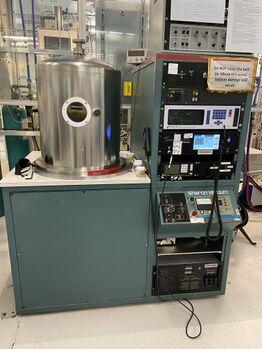E-Beam 1 (Sharon): Difference between revisions
No edit summary |
|||
| Line 240: | Line 240: | ||
*Deposition Control: Inficon IC 6000, 6 film programs; 37 parameters for automatic or manual deposition control based on a resonating quartz crystal sensor |
*Deposition Control: Inficon IC 6000, 6 film programs; 37 parameters for automatic or manual deposition control based on a resonating quartz crystal sensor |
||
*Ion Source: Commonwealth Scientific Corp., MOD. 2. Kaufman-type, 3cm ion source; beam currents to 100mA at 1000eV |
*Ion Source: Commonwealth Scientific Corp., MOD. 2. Kaufman-type, 3cm ion source; beam currents to 100mA at 1000eV |
||
= See Also = |
|||
'''Links to documents pertaining to the tool...''' |
|||
*[http://www.google.com Article about E-beam Deposition...] |
|||
*[http://www.google.com Research from other university...] |
|||
*etc. |
|||
= Documentation = |
= Documentation = |
||
Revision as of 14:56, 10 July 2012
| ||||||||||||||||||||
About
The Sharon is a cryo-pumped thin film evaporator with a Temescal four hearth 270° bent beam evaporation source. The system incorporates a Commonwealth Scientific Corp. ion source for in-situ sample cleaning. Fixturing in the Sharon will accept any size sample up to 3.5-inch diameter. In addition, a rotation fixture is easily installed which permits adjustable angle, 360° variable speed rotation of any size sample, up to 1.5-inch diameter. This feature is particularly useful for promoting step coverage of irregular surfaces.
The Sharon is used for the evaporation of high purity metals, e.a. Al, Au, Ni, Ge, AuGe, Ti, Pt etc., for interconnect and ohmic contact metalization for fabrication of III-V compound semiconductor and silicon device fabrication.
Materials Table
Materials Table
| |||||||
|---|---|---|---|---|---|---|---|
| Material | Position | Hearth / Crucible | Film Number | Density | Z Ratio | Tooling | Comments |
| Ag | 4 | C | 5 | 10.5 | 0.524 | 140 | |
| Al | 2 | C | 6 | 2.7 | 1.080 | 118 | |
| Al2O3 | 1 | C | 6 | 3.97 | 0.50 | 169 | |
| Au | 4 | C | 4 | 19.3 | 0.381 | 138 | Bazookas can be used at 20-30Å/sec. |
| AuGe | 3 | C | 5 | 17.63 | 0.397 | 151 | Composition unpredictable unless you practically empty the crucible. |
| Cr | 3 | H | 6 | 7.2 | 0.305 | 140 | Do not evaporate more than 200Å of Cr in the E-Beam evaporator. |
| Fe | 7.86 | 0.349 | |||||
| Ge | 3 | C | 6 | 5.35 | 0.516 | 130 | |
| MgO | 1 | 6 | |||||
| Mo | 10.2 | 0.257 | |||||
| Ni | 1 | H | 1 | 8.91 | 0.331 | 140 | Prone to spitting. Cool down for 15 minutes before venting. |
| NiCr | 1 | H | 6 | 8.23 | 0.321 | ||
| Nb | 4 | C | 6 | 8.57 | 0.516 | Cool down for at least 35 minutes before venting. | |
| Pd | 1 | H | 9 | 12.0 | 0.357 | 140 | |
| Pt | 1 | C | 8 | 21.40 | 0.245 | 140 | Prone to spitting. Evaporate at 1.5Å/sec or less. |
| Si | 2 | H | 2 | 2.32 | 0.712 | 150 | Cool down very slowly after evaporating lest you crack the source. |
| SiO | C | 6 | 2.13 | 0.87 | 132 | ||
| SiO2 | 1 | C | 6 | 2.2 | 1.07 | 140 | Please change the crystal and the upper mirror after evaporating oxide. |
| SrF | 1 | C | 6 | 4.28 | 0.727 | 140 | |
| Ta | 1 | H | 6 | 16.6 | 0.262 | Requires extremely high current. Minimum 35 minute cool down. Hearth #3 may be used. Call me before you try Ta. | |
| W | 1 | C | 6 | 19.3 | 0.163 | 138 | |
| Ti | 3 | H | 3 | 4.50 | 0.628 | 139 | |
Detailed Specifications
- Cryopump: CTI Cryotorr 8F with air-cooled compressor
- Pumping speed: 4,000 l/sec. for H2O, 1,500 l/sec. for air, 2,200 l/sec. for H2, 200 l/sec. for Ar
- Mechanical Pump: Varian, Model SD700, 35 CFM
- Electron Beam Source: Temescal, Model STIH-270-2MB, four 15 cc hearths
- Electron Beam Power Supply: Temescal, Model CV8A-111, -5 to -10 kV dc, 0.8A dc max. beam current; XYS-8 Sweep Control
- Deposition Control: Inficon IC 6000, 6 film programs; 37 parameters for automatic or manual deposition control based on a resonating quartz crystal sensor
- Ion Source: Commonwealth Scientific Corp., MOD. 2. Kaufman-type, 3cm ion source; beam currents to 100mA at 1000eV
